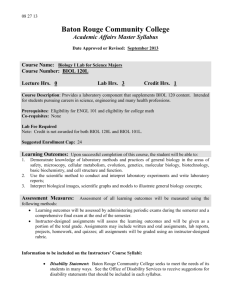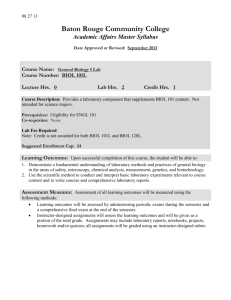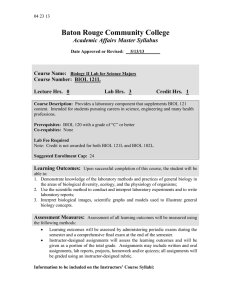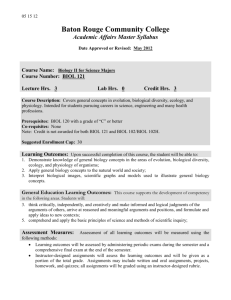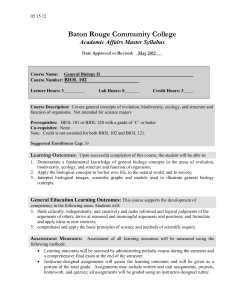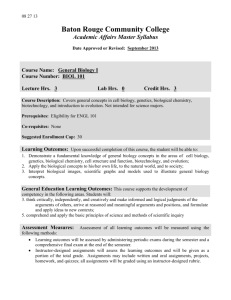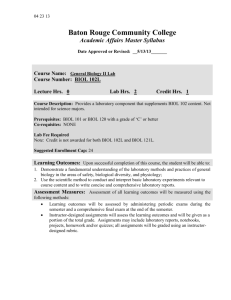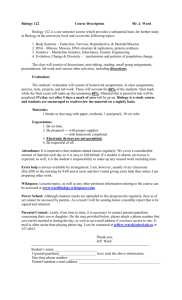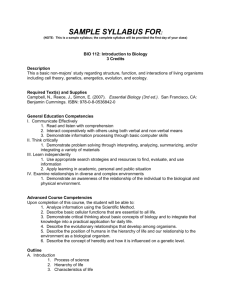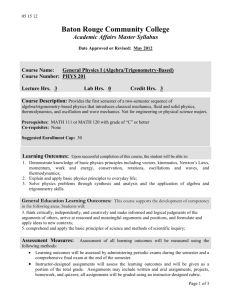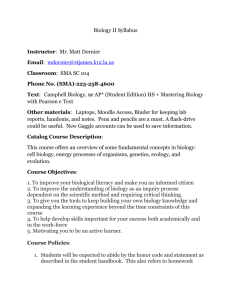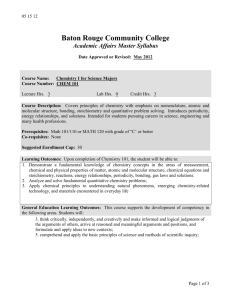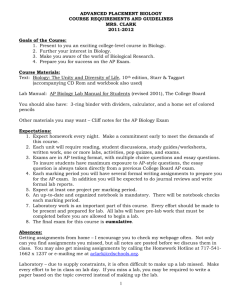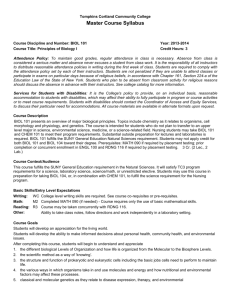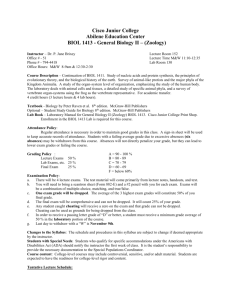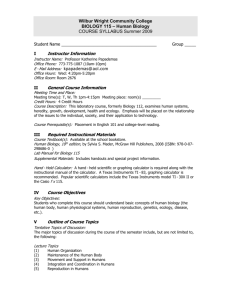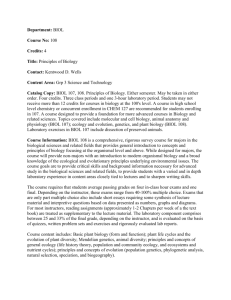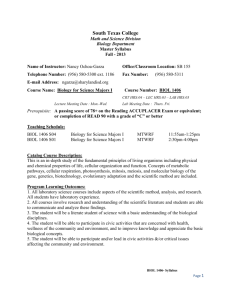BIOL 120_MS - Baton Rouge Community College
advertisement
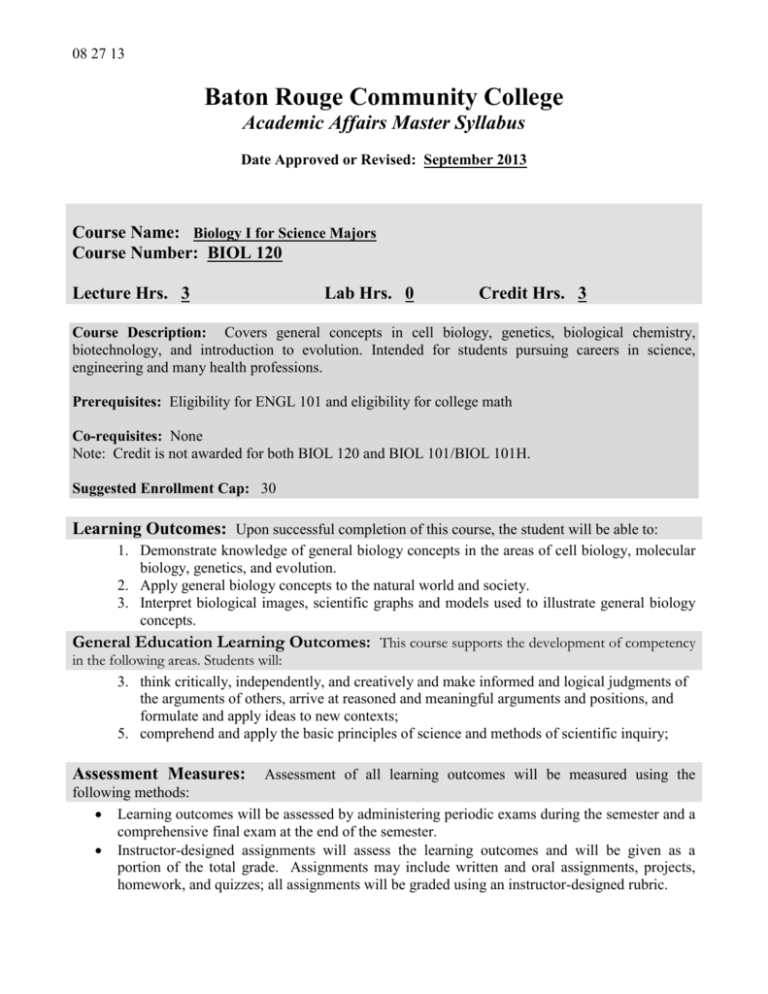
08 27 13 Baton Rouge Community College Academic Affairs Master Syllabus Date Approved or Revised: September 2013 Course Name: Biology I for Science Majors Course Number: BIOL 120 Lecture Hrs. 3 Lab Hrs. 0 Credit Hrs. 3 Course Description: Covers general concepts in cell biology, genetics, biological chemistry, biotechnology, and introduction to evolution. Intended for students pursuing careers in science, engineering and many health professions. Prerequisites: Eligibility for ENGL 101 and eligibility for college math Co-requisites: None Note: Credit is not awarded for both BIOL 120 and BIOL 101/BIOL 101H. Suggested Enrollment Cap: 30 Learning Outcomes: Upon successful completion of this course, the student will be able to: 1. Demonstrate knowledge of general biology concepts in the areas of cell biology, molecular biology, genetics, and evolution. 2. Apply general biology concepts to the natural world and society. 3. Interpret biological images, scientific graphs and models used to illustrate general biology concepts. General Education Learning Outcomes: This course supports the development of competency in the following areas. Students will: 3. think critically, independently, and creatively and make informed and logical judgments of the arguments of others, arrive at reasoned and meaningful arguments and positions, and formulate and apply ideas to new contexts; 5. comprehend and apply the basic principles of science and methods of scientific inquiry; Assessment Measures: Assessment of all learning outcomes will be measured using the following methods: Learning outcomes will be assessed by administering periodic exams during the semester and a comprehensive final exam at the end of the semester. Instructor-designed assignments will assess the learning outcomes and will be given as a portion of the total grade. Assignments may include written and oral assignments, projects, homework, and quizzes; all assignments will be graded using an instructor-designed rubric. 08 27 13 Information to be included on the Instructors’ Course Syllabi: Disability Statement: Baton Rouge Community College seeks to meet the needs of its students in many ways. See the Office of Disability Services to receive suggestions for disability statements that should be included in each syllabus. Grading: The College grading policy should be included in the course syllabus. Any special practices should also go here. This should include the instructor’s and/or the department’s policy for make-up work. For example in a speech course, “Speeches not given on due date will receive no grade higher than a sixty” or “Make-up work will not be accepted after the last day of class.” Attendance Policy: Include the overall attendance policy of the college. Instructors may want to add additional information in individual syllabi to meet the needs of their courses. General Policies: Instructors’ policy on the use of things such as beepers and cell phones and/or hand held programmable calculators should be covered in this section. Cheating and Plagiarism: This must be included in all syllabi and should include the penalties for incidents in a given class. Students should have a clear idea of what constitutes cheating in a given course. Safety Concerns: In some programs this may be a major issue. For example, “No student will be allowed in the safety lab without safety glasses.” General statements such as, “Items that may be harmful to one’s self or others should not be brought to class.” Library/ Learning Resources: Since the development of the total person is part of our mission, assignments in the library and/or the Learning Resources Center should be included to assist students in enhancing skills and in using resources. Students should be encouraged to use the library for reading enjoyment as part of lifelong learning. Expanded Course Outline: I. The Cell A. Basic Chemistry B. The Chemistry of Organic Molecules C. Cell Structure and Function D. Membrane Structure and Function E. Metabolism: Energy and Enzymes F. Photosynthesis G. Cellular Respiration H. Cellular Reproduction and the Cell Cycle 08 27 13 II. III. Genetic Basis of Life A. Meiosis and Sexual Reproduction B. Mendelian Patterns of Inheritance C. Chromosomes and Genes D. Human Genetics E. DNA Structure and Function F. Gene Activity: How Genes Work G. Genome Organization and Regulation of Gene Activity H. Biotechnology Evolution A. B. Darwin and Evolution Process of Evolution
